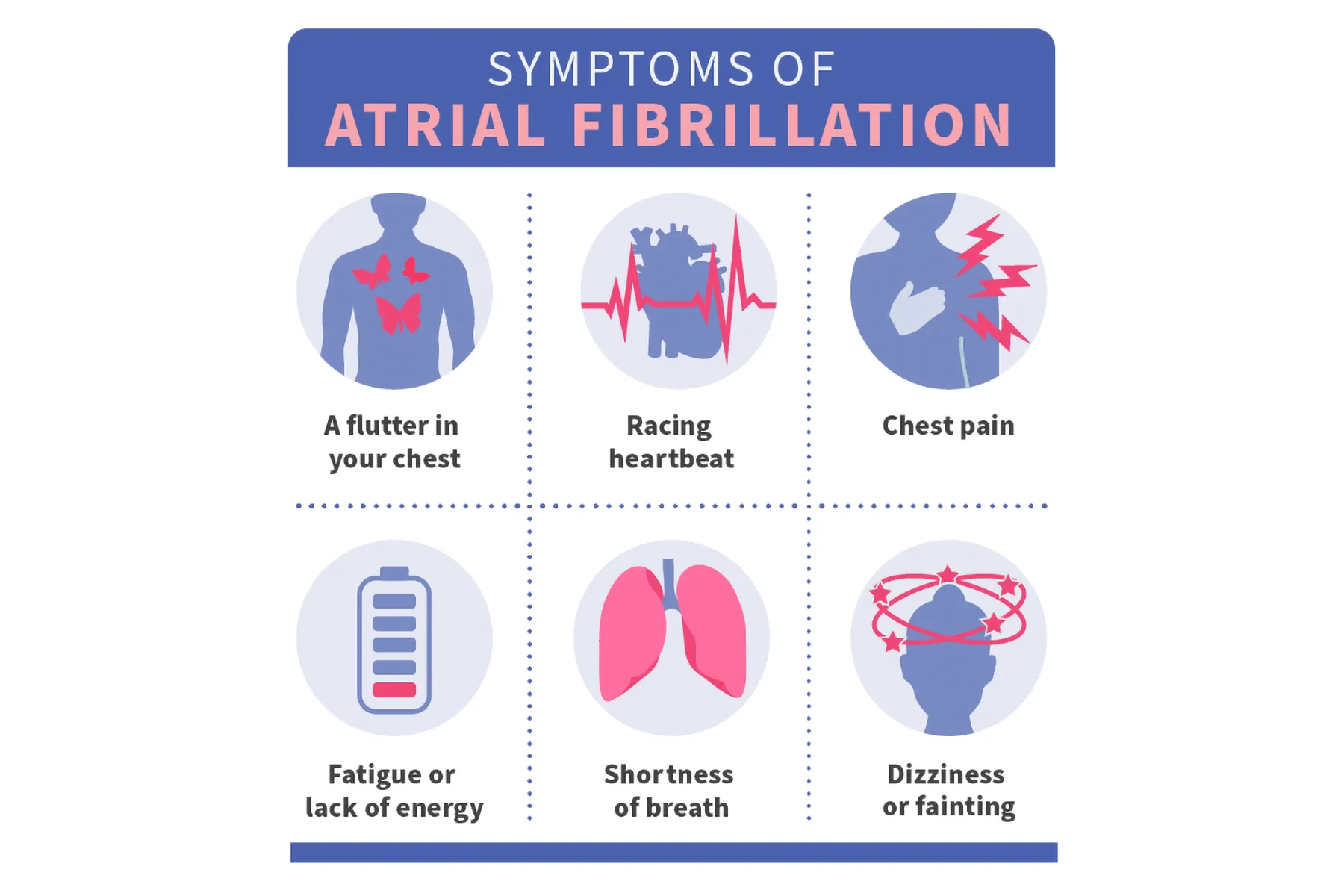When you put your hand on your chest, you might feel your heart's familiar lub-dub beat. If your heart races rather than beats and the feeling lasts for a few minutes, that’s a sign you might have a condition called atrial fibrillation. You might hear it called AFib for short.
Some of these symptoms, such as shortness of breath or chest pain, can mimic those of a heart attack. If you aren’t sure whether you have AFib or you're having a heart attack, call your doctor or 911.
What Is Atrial Fibrillation (AFib)?
When you have this condition, faulty electrical signals make your heart flutter or beat too fast. This abnormal rhythm stops your heart from pumping as well as it should. Your blood flow can slow enough to pool and form clots. AFib raises your chances for a stroke and other heart problems.
AFib Symptoms

You might feel:
- Heart palpitations -- a flutter in your chest or heartbeat that races, pounds, or flutters
- Pain and pressure or tightness in your chest
- Confused
- Dizzy
- Faint or lightheaded
- Short of breath
- Sweaty
- Weak
- Fatigue or lack of energy
- Quick or uneven pulse
- Have to pee more often
Not everyone with AFib has a racing or pounding heartbeat. A few things can affect whether you have symptoms and how severe they are, including:
- Your age -- older people often don't have symptoms
- What caused your AFib
- How much it affects your heart's ability to pump
Does AFib cause fatigue?
Fatigue, or extreme tiredness, happens a lot with atrial fibrillation. It's the most common symptom of the condition.
Symptoms of AFib in women
Women may have more subtle symptoms of AFib, like weakness and fatigue, and not the more obvious signs of illness. Doctors often diagnose women with AFib later than men.
AFib symptoms in older adults
Older adults may not have any symptoms of AFib, with doctors only discovering the condition during a routine checkup or electrocardiogram (EKG).
AFib symptoms at night
The symptoms of AFib at night can feel different from those during the day. Symptoms can include:
- Heavy breathing while you sleep
- Sweating a lot
- A strange feeling in your chest when you wake up
- Anxiety
- Sleep apnea
What is a dangerous heart rate with AFib?
A dangerous heart rate with atrial fibrillation depends on several things, including your overall health and other medical conditions. In general, a heart rate that is routinely above 100 beats per minute (bpm) or below 60 bpm can be considered dangerous.
You may also need treatments to lower your heart rate, or you may not need anything done at all. Your doctor may also suggest medication to lower your chance of having a stroke.
Make an appointment with your doctor if you have symptoms that could be AFib, especially if you have any risk factors. The doctor can diagnose AFib and prescribe any treatments you need.
If you feel chest pain or pressure, it could be a heart attack. Don’t wait to tell your doctor at your next appointment. Call 911 or go to the emergency room right away.
AFib Risk Factors
Whether or not you notice any symptoms, you may be more likely to get AFib if you have any of these risk factors:
- Older age
- High blood pressure
- Obesity
- Family history of AFib
- Alcoholism, heavy drinking, or binge drinking
- Other heart conditions like heart disease, heart valve problems, or heart failure
- Previous heart surgery
- Diabetes
- Thyroid problems
- Chronic Kidney Disease
- Lung disease
- Sleep apnea
- Drug use
What Does AFib Feel Like?
You might feel a flutter or quiver in your chest when your heart beats. Your heart might beat faster than usual, pound, or race. The feeling often lasts for a few minutes. Sometimes your heart will skip a beat.
A regular heartbeat, or what your doctor will call normal sinus rhythm, is a “lub-dub, lub-dub” sound. Your heart contracts and relaxes to move blood from the upper chambers (called the atria) to the lower ones (the ventricles) and out to your body.
Atrial fibrillation symptoms vs. flutter
Atrial flutter is another type of abnormal heart rhythm. It happens when a short circuit causes the upper chambers of your heart (atria) to pump too fast.
In atrial fibrillation, the heart's electrical impulses come from multiple areas, causing the atrial walls to contract instead of contracting normally. Your heart doesn't pump as well, and the irregular impulses lead to a heartbeat that's erratic and faster than normal. In atrial flutter, the electrical impulses are more organized. The atria contract, but too quickly. Plus, only every second atrial impulse reaches the heart's lower chambers, resulting in a heart rate that's consistently fast but regular.
How Long Do Atrial Fibrillation Symptoms Last?
Doctors classify AFib by how long your symptoms last. The fluttering goes on longer with some forms than others:
- Paroxysmal fibrillation last 7 days or less
- Persistent AFib lasts for more than 7 days
- Long-term persistent AFib lasts for more than 1 year
- Permanent AFib doesn't go away
If your AFib continues for many months or years, you can reach the point where you barely notice the symptoms. Sometimes, they don't go away on their own. Your doctor may have to treat you to bring your heart back into the right rhythm.
When Should I Call a Doctor?
Call your doctor if your heart doesn't go back into a normal rhythm within a few minutes or your symptoms get worse.
When should I call 911?
Call 911 right away if you have these symptoms, which could be signs of a heart attack or stroke:
- Pain or pressure in the middle of your chest that lasts more than a few minutes
- Pain that spreads to your jaw, neck, arms, back, or stomach
- Nausea
- Cold sweat
- Drooping face
- Arm weakness
- Trouble speaking
Your doctor will do tests to check your heartbeat and the electrical impulses in your heart. These and other tests can show whether you have AFib.
If you do have an irregular heartbeat, you can get treatments to bring it back into a normal rhythm.
Takeaways
Atrial fibrillation, or AFib, is a condition of the heart where faulty electrical signals cause it to flutter or beat too fast. It raises your chances of a stroke and other heart problems. If your doctor diagnoses you with AFib, they may suggest lifestyle changes like changes to your diet and weight, managing stress, and quitting smoking. They could also prescribe medicines that help you avoid blood clots and those that slow your heart rate.
Atrial Fibrillation FAQs
What is the main cause of atrial fibrillation?
Changes to your heart's tissue or electrical signals are the main causes of AFib.
How serious is atrial fibrillation?
AFib isn't dangerous on its own, but you will need treatment to avoid other serious health problems like stroke.
How can I control my anxiety with atrial fibrillation?
Lowering your stress levels can help you manage AFib. Exercise (especially walking), mindfulness exercises, yoga, meditation, and deep breathing are all ways to relax.

